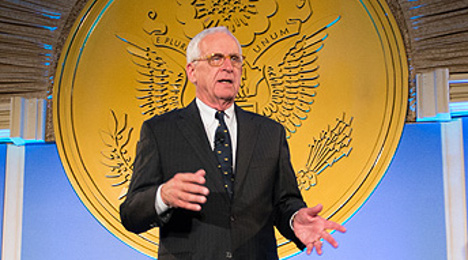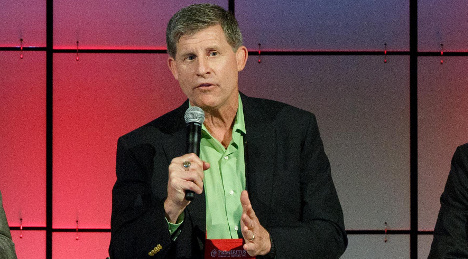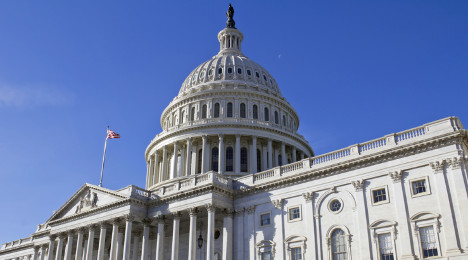Dealertrack Technologies associate counsel for regulatory and compliance Randy Henrick will be hosting another free webinar to discuss updated rules and the latest enforcement actions brought against dealers by the Federal Trade Commission.
During the session titled, “Dealer Advertising: New Media, New Rules, New Enforcement,” Henrick will also share best practices associated with dealer advertising to help safeguard stores, focusing on:
• The current regulatory environment for dealers
• What does the FTC consider deceptive advertising?
• What specific advertising is the FTC targeting both in traditional media and online?
• What are the standards for clear and conspicuous advertising?
• Best practices for advertising to protect your business from penalties and violations.
The free hour-long webinar that’s set to include a Q&A session is scheduled for 2 p.m. ET on Nov. 19.
Free registration for the session can be complete here.
Consumer Portfolio Services chairman and chief executive officer Brad Bradley explained why the company’s noticeable rise in delinquencies stems from adjustments in collection practices that federal regulators forced the company to make.
To recap, back in May of last year, CPS reached a $5.5 million settlement with the Federal Trade Commission to squash charges that the subprime auto finance company used “illegal tactics” to service and collect consumers’ loans, including collecting money consumers did not owe, harassing consumers and third parties, and disclosing debts to friends, family and employers.
During the company’s quarterly conference call earlier this week, Bradley indicated that it took CPS about six months to modify its collections practices, acknowledging that some personnel in this department have been with the company for some so “trying to get them to learn and do it another way is a long process.”
As a result, CPS reported that its third quarter delinquencies greater than 30 days (including repossession inventory) jumped from 6.66 percent to 8.81 percent. The year-over-year movement triggered a series of questions from investment analysts who wanted to know how that metric was going to impact CPS’ defaults and recovery rates, which also softened year-over-year from 44.6 percent to 40.0 percent.
To quell concern, Bradley spelled out exactly how the collection process unfolds at CPS nowadays.
“Back in the day, you could call a customer up and say, ‘Hey, you are 30 days down or one payment down or two payments down. You need to pay me today or we are going to repossess your car,’” Bradley said. “The regulatory folks didn’t like us saying that to them. You don’t get to say that until they are about 90 days down, three payments. And shockingly when you say, then it works.”
Bradley indicated federal regulators described previous practices when a borrower was behind on payments as “threatening.” CPS has been forced to ease back on the demands for immediate payment but collectors still remain firm when the account hits 90 days past due.
“We may not particularly agree with the term threatening, but at least then you push (delinquent customers) to say, ‘Hey, ‘You need to pay us today or you’re in serious risk of losing your car.’ Then a lot of people pay,” Bradley said. “To the extent you say, ‘Hey, it’s really important you pay, and let’s work something out,’ shockingly they still pay, just takes an extra two months. That’s really fundamentally the exact difference of what we are doing.
“A lot of the way collections is driven in many companies including ours, is you want the collector to collect the payment today. You want them to get the customer to send something today,” he continued. “In the new world, that isn’t really the way to do it. So it’s taking us a dramatic amount of time to convince our collectors not to try and get them pay today.
“The customer says, ‘Hey, I can probably pay you next week.’ That wasn’t good enough in the old dynamic,” Bradley went on to say. “Eventually they do because at the end of the road, you got to tell him, you are in danger of losing your car and that’s when they pay.”
But analysts still wondered if CPS’ portfolio would deteriorate with delinquencies on the rise and recovery rates softening because of company officials conceding that rising off-lease volume is impacting what they can get back in the repossession lanes on the wholesale market. Bradley is confident funds eventually will flow into the company as payments; they might be just delayed.
“In the regulatory environment, you don’t push anymore,” Bradley said. “You give them the time not to string you along, but take some more time.
“There’s two aspects,” he continued. “One is the manner in which you have to address the customers, and two is the dynamic of how the collection arms work. The collection arms used to work to get the money in today, period. And now that’s not true.
“It’s a simple explanation at some level. It is a lot tougher to make it all work,” Bradley added.
Q3 financial report
CPS reported that its Q3 earnings came in at $8.8 million, or $0.28 per diluted share. Those figures are higher than a year ago when net income came in at $7.8 million, or $0.24 per diluted share. The improvement represented a 16.7-percent increase in diluted earnings per share.
The company generated a 22-percent rise in Q3 revenue, watching it climb from $77.1 million to $94.0 million. Meanwhile, CPS noted total operating expenses for the third quarter increased $15.1 million or 23.9 percent to $78.3 million
During the third quarter, CPS purchased $287.5 million of new contracts, an increase of 2.9 percent, compared to $279.3 million during the third quarter of last year. The company's managed receivables totaled $1.941 billion as of Sept. 30, an increase from $1.822 billion as of June 30 and $1.519 billion as of the end of last year’s third quarter.
“We are pleased with our operating results for the third quarter of 2015,” Bradley said. “Our managed portfolio is now in excess of $1.9 billion and we achieved our 16th consecutive quarter of increasing quarterly earnings.”
In another effort to implement cost-saving and innovative technology-based initiatives to foster business and meet the demands of its expanding customer base, Westlake Financial Services is now available on RouteOne’s eContracting platform.
This development arrives not long after Westlake announced it was expanding its servicing team at the WFS Production Center in Dallas.
Westlake Financial Services group president Ian Anderson explained why the company made this move with RouteOne.
“For Westlake, RouteOne eContracting is all about providing faster funding to our dealers,” Anderson said. “We’ve always been about auto-decisioning, and we see this as a step toward auto-originations.”
Anderson emphasized that Westlake’s strategic advantage includes offering a comprehensive, fast and secure originations process. This process is supported by pairing dealerships with knowledgeable credit analysts to assist them in buying deals, verifying stipulations and funding.
“RouteOne is a great partner to Westlake and to our dealers,” Westlake senior vice president of sales Mark Vazquez said. “Launching eContracting will add efficiencies in our originations process by getting decisions faster, reducing contract errors, and in the end, providing better service through faster funding.”
Using RouteOne’s eContracting platform, dealers can receive electronic validation and distribution, ability to audit throughout the entire contracting life-cycle, and a user-friendly signing process that can be done using signature pads, tablets or nearly any touch-screen device.
“We are pleased to expand our finance source availability to our dealer customers,” RouteOne chief executive officer Mike Jurecki said.
“Both RouteOne and Westlake are passionate about technology and bringing efficiencies to the entire vehicle purchasing process,” Jurecki continued. “eContracting accomplishes this in many ways including seamless sharing of data and comprehensive validation prior to the customer signature, all which lead to faster funding and improved customer satisfaction index.”
Dealerships interested in financing their customers through Westlake financing can go to www.westlakefinancial.com or can learn more information by calling (888) 893-7937. Dealers and finance sources interested in eContracting can contact RouteOne at (866) 768-8301.
As dealerships continue to modernize and position their F&I services to deliver a more engaging and compliant customer experience in less time, their need for timely information, best practices and how-to tips is increasing.
In response, MaximTrak Technologies, an F&I technologies platform and services provider, recently launched a new interactive technology website and content-rich learning initiative for auto, powersports and RV dealerships.
“We recreated our digital face to better deliver answers to the questions dealer principals and general managers ask about resources that can help their F&I departments adjust to the changing rules, practices and consumer behaviors radically altering F&I,” MaximTrak president Jim Maxim Jr. said.
The company pointed out that dealerships using MaximTrak report an average 33-percent increase in service contract penetration and over $500 per car higher PVR (per vehicle retailed).
For Chrysler Mopar and its private labeled solution called MenuConnect, MaximTrak helped boost average dealer increases of over $535 per vehicle.
A 2015 re-examination of this original study and involving more dealerships shows these dealers now achieving even greater PVR results.
Maxim explained the company’s new website continues to address client feedback.
“Dealers, GMs and F&I staff who now view maximtrak.com can shop the latest digital F&I tools and view and download educational whitepapers, videos, e-books and other learning resources that can help them be more successful — for themselves, their employers and their customers,” he said.
“Our goal is make our clients’ F&I processes more profitable and compliant while moving their customers through the process in less time, which multiple consumer surveys confirm contribute to customer satisfaction,” Maxim said.
Maxim went on to mention the MaximTrak platform can transform the vehicle delivery process into a customer friendly program that converts conventional F&I wisdom into consistent, repeatable and sustainable results.
For more information, call (800) 282-6308 or visit www.maximtrak.com.
Creditors, servicers and collectors need to quickly re-evaluate their approach to how they interact with consumers in the wake of the Westlake Financial Services/Wilshire Consumer Credit consent decree with the Consumer Financial Protection Bureau. Much like DriveTime and other scary cases these past few years, this matter serves as another illustration of the acts and practices that will raise the ire of this regulatory juggernaut.
The amounts are staggering — $44.1 million in cash relief and balance reductions to the victims plus a $4.25 million civil penalty.
The numerous illegal and deceptive practices that resulted in these penalties are disturbing: using phony called ID, threatening investigation and criminal prosecution, misrepresenting of payment amounts necessary to release repossessed vehicles, and disclosing of borrowers loan information to employers, family and friends, just to name some.
It’s time for a paradigm shift. If the goal is to avoid overly aggressive collection tactics that will create legal headaches, then look for alternatives that will create better paying customers. This doesn’t just mean better underwriting. It means changing the relationship between company and customer.
Status quo
Too many companies are comfortable doing business the way it’s “always” been done and resist change. They see nothing wrong with payment books and a long line of customers looking to make payments every weekend. They cling to the notion that they “want to see the collateral,” even though they can’t name the last time they did anything more than take the payment at the window. They operate with a false sense of security and a strategy of “hope” rather than embrace the ample technology tools that can help drive the bottom line, provide a better customer experience, and keep the regulators at bay. It’s time to be aggressive and look for ways to create a compliant customer experience that provides more payment options and transparency and, as a result, less of an opportunity for conflict and escalation.
For example, there are still companies that don’t provide customers with the ability to pay online from a website. These folks are missing two important points: first, establishing an online payment portal adds to efficiency, reduces collector “talk time” which is expensive, and reduces the opportunity for customer conflict. Secondly, customers’ like having payment alternatives and, judging from the rapid growth in consumer acceptance of this method, seemingly prefer doing business at a distance instead of face to face.
The rise in IVR (interactive voice response) and payments by text are two additional technologies that customers like to use. Businesses should like them too because they free up valuable personnel time and assure consistent communications with customers. Using an IVR system not only frees up valuable personnel time, it allows consistent and transparent messaging while allowing your customers to pay or make payment arrangements. Texting is especially exciting because not only can businesses send payment reminders, they can actually offer “pay by text” products that allow customers the freedom to do business on their schedule, not just when the car lot or call center are open. As more people manage their lives on their cell phones, it will be important for the industry to keep up with this promising tool.
A different way
Setting up customers on automatic electronic payments is perhaps the most underutilized tool in the industry’s arsenal. In this method, customers provide their payment information ahead of time and agree that a set amount will be paid at regular intervals. While the extension of credit can’t be conditioned on signing up for electronic payments, customers can be incented with things like free oil changes and gift cards. The benefits are far reaching: collecting becomes more efficient because the payments are made automatically and the potential for conflict is reduced because human intervention is not involved.
Too many companies neglect to drive adoption of this tool because they are fearful of those customers that may cancel the automatic payments or some payments not being made because of insufficient funds. That is analogous to letting the bottom 10 percent of your customers ruin it for the other 90 percent and is being reactionary instead of pro-active. Find an effective way to drive your customers to electronic payments and you will reap the benefits.
What do all of these methods have in common? They increase efficiency while at the same time removing the possibility of human conflict, which is the fastest way to ruin a positive customer relationship. If the ugly disputes and customer confrontation are replaced with efficient technology, then the overall customer experience will be more positive, less resources will be spent on those customers, and more resources can be pointed in the direction of those most difficult customers that need the attention. Just be sure to point those resources in such a way as to avoid those activities the CFPB likes to attack.
Susan Perlmutter is chief revenue officer and Steve Levine is chief legal and compliance officer of Sigma Payment Solutions, a provider of payment technology products for creditors and other businesses. For more information, visit SigmaPayments.com.
This week, Reynolds Document Services, a segment of Reynolds and Reynolds, released the Reynolds LAW Washington F&I Library, a comprehensive catalog of standardized, legally reviewed finance and insurance documents available to franchised dealers in the state of Washington.
Reynolds reiterated LAW brand documents can help dealers reduce their litigation risk. The documents in the LAW Washington F&I Library are regularly reviewed for compliance with the latest regulations. Reynolds’ forms specialists lead the review alongside Reynolds’ outside legal partners.
In addition, by using the standardized vehicle deal documents in the LAW Washington F&I Library, dealers can achieve a more consistent and effective F&I process in every transaction, which can improve the effectiveness of the F&I manager as well as improve the car-buying experience for the customer.
“Despite the improving economy, automobile retailers continue to face a number of pressures that impact the success of their business,” said Jerry Kirwan, senior vice president and general manager of Reynolds Document Services.
“Among those pressures are increasing levels of regulatory scrutiny as well as higher expectations from consumers for a more rewarding car-buying experience,” Kirwan continued. “Part of Reynolds’ response is to develop document services that help dealers address those pressures and prepare them for the future.
“This library of standardized documents is designed to help dealers better manage risk, improve the customer experience in F&I and prepare for the age of electronic transactions ahead,” he went on to say.
The printed documents in the LAW Washington F&I Library are also available in digital format, which can help to facilitate the conversion to laser-printed transactions or e-contracting. Reynolds Document Services maintains licensing agreements with all major providers of electronic F&I solutions.
Now along with Washington, Reynolds has libraries for:
— Tennessee
— Maryland
— North Carolina
— Louisiana
— Alabama
— Massachusetts
— Ohio
— California
— Illinois
— Pennsylvania
— West Virginia
The National Automobile Dealers Association chose an appropriate time to conduct its Washington Conference with all of the vehicle financing activity that percolated out of the nation’s capital last week.
More than 500 franchised dealers and dealer association executives from across the country traveled to Capitol Hill for NADA’s event to attend briefings and meet with members of Congress to discuss key policy issues, which include protecting consumer choice in auto financing and supporting legislation that boost consumer recall completion rates.
In remarks to conference attendees, NADA chairman Bill Fox stressed the importance of correcting misconceptions in the nation’s capital about the retail-auto industry.
“There’s a disturbing pattern of regulators wrapping ‘red tape’ around our industry and yet, they don’t fully understand it,” said Fox, a franchised dealer in the upstate New York cities of Auburn and Phoenix. “That’s why we need to keep working hard to get H.R. 1737 passed in the House, and explain that dealer-assisted financing is really a consumer issue.”
In July, the House Financial Services Committee passed NADA-backed H.R. 1737 by a bipartisan vote of 47-10 to rescind what the association called the Consumer Financial Protection Bureau’s “flawed” auto finance guidance that would limit or eliminate a customer’s ability to receive discounted auto loans at dealerships. This bill also calls for more transparency from the agency and a public notice and comment period when future auto lending guidance is issued.
NADA’s zeal to get the measure passed gained more steam as the CFPB made a pair of enforcement actions while dealers were in Washington, D.C. First, the CFPB ordered Fifth Third Bank to cap dealer markup at either 1.25 percent or 1 percent, depending on the length of the installment contract. Then, the bureau handed a penalty topping $44 million against Westlake Financial Services for infractions association with debt-collection practices.
Furthermore, the subject of auto financing was one of primary topics lawmakers asked CFPB Richard Cordray to address during his semiannual appearance in front of the House Financial Services Committee.
That same group of legislators also managed to push ahead a measure that likely will get cheers from NADA.
Bipartisan legislation sponsored by Rep. Steve Stivers, a Republican from Ohio, and Rep. Tim Walz, a Democrat from Minnesota, that would create the position of an independent inspector general (IG) at the CFPB passed out of committee.
“The CFPB has been given broad authority and must be accountable to the American people,” Stivers said. “More than 30 other federal departments and agencies have an independent inspector general. This bill would bring the CFPB in line with these agencies and provide the necessary oversight and transparency.”
The CFPB receives its operating funds from the Federal Reserve. Currently, the lawmakers indicated the bureau has very little Congressional oversight and does not have an independent inspector general solely dedicated to the agency. Instead, the CFPB shares an inspector general with the Federal Reserve, which is appointed by the Fed Chairman.
The bill sponsored by Stivers and Walz would amend the Inspector General Act of 1978 to establish an independent inspector general for the CFPB.
“The CFPB is an important agency that works to ensure that you, the consumer, are protected from things like predatory payday lenders, shoddy mortgage bankers and defective products. Their work is important, but that doesn’t mean that they don’t need oversight,” Walz said.
“I believe the appointment of an independent inspector general will only increase their ability to fulfill their important mission and I am pleased this legislation passed out of committee,” he went on to say.
Having passed the committee, H.R. 957, the Bureau of Consumer Financial Protection-Inspector General Reform Act of 2015, will soon head to the House floor.
Meanwhile, a week ago, dealers and state dealer groups made more than 300 congressional visits on Capitol Hill to increase bipartisan support for H.R. 1737. The bill currently has 147 cosponsors (86 Republicans and 61 Democrats). A full House vote is expected this fall.
Furthermore, concerning proposed bills on recalls, Wes Lutz, chairman of NADA’s Government Relations Committee, urged dealers to ask their members of Congress not to cosponsor H.R. 2198 and H.R. 1181, saying the legislation “misses the mark by requiring recalled vehicles be grounded instead of actually fixed.”
Lutz pointed out there are 46 million vehicles on the road today under open recall, but many of the defects have nothing to do with vehicle safety
“Imagine what would happen if dealers could only offer a fraction for customer trade-ins, or couldn’t accept them at all. This could be the reality if the Blumenthal amendment is passed,” said Lutz, a dealer in Jackson, Mich. “Dealers support a 100 percent recall completion rate. Congress should focus on legislation that helps increase recall completion rates.”
In developments that frustrated a trio of franchised dealer trade groups, it appears the Consumer Financial Protection Bureau strengthened two regulatory patterns when the agency released its enforcement action against Fifth Third Bank earlier this week.
To get some clarity about those trends as they relate to possibly pursuing litigation as well as capping dealer participation, SubPrime Auto Finance News again reached out to Michael Thurman, who spent more than 20 years of his nearly three-decade career at firms including Keesal, Young & Logan as well as Loeb & Loeb before opening his own firm.
“What I’m seeing is a pretty obvious pattern that the CFPB is going to work its way through the auto finance industry until everyone has either consented formally or informally to the terms that they’re imposing,” Thurman said during a phone conversation on Thursday. “It looks to me like they’re going to work their way through the industry until the limitations that they’ve set in their orders become basically the industry standard unless someone is willing to take them on in a litigated enforcement action.
“Obviously some of the bigger players have already reached resolutions,” he continued. “So if you’re a smaller player, you see that and you think to yourself, ‘If they’re not going to step up and fight this, it probably makes sense for us to take a similar approach as Fifth Third Bank and basically reach a cooperative resolution.’”
To recap as part of its $18 million penalty in the auto space, the CFPB and Department of Justice ordered Fifth Third Bank to substantially reduce or eliminate entirely dealer discretion. Fifth Third Bank will reduce dealer discretion to mark up the interest rate to only 1.25 percent above the buy rate for auto loans with terms of 5 years or less, and 1 percent for auto loans with longer terms. Fifth Third also has the option under the order to move to non-discretionary dealer compensation.
The mandates are quite similar to what regulators asked of American Honda Finance Corp. as part of an action detailed this summer.
The caps on dealer participation arrived as CFPB Richard Cordray touched on the practice when he appeared to give his semiannual report to the U.S. House Financial Services Committee this week. Cordray described the dealer participation as “a practice that we believe is discriminatory,” and caps being “a fair way to try to address the issue.”
Thurman tried to tackle questions as to why the CFPB seems so adamant about why discrimination happens during the markup process.
“My sense is that they’re really acknowledging that they don’t see any intentional discrimination on the part of the auto finance companies, and that they don’t necessarily see any internal procedural discrimination by auto finance companies,” he said. “Where they see the open hole where statistical discrimination can occur is by allowing the dealer to have significant discretion.
“What they’re really doing is saying, ‘We are going to impose restrictions on the amount of discretion a dealer can have which we believe will limit the amount of statistical discrimination that will result,’” Thurman went on to say.
Perhaps like many industry players, Thurman still questions how the CFPB arrives at any discrimination allegations at all since the bureau use the theory of disparate impact.
“From my perspective, I can’t lose track of the fact that this really is a set of cases based on alleged statistical discrimination,” Thurman said. “The CFPB is not claiming in any of these cases an intent on the part of either the part of the dealer or the finance company to raise rates on consumers of diverse minorities. But instead what they’re saying is that based on this analysis that they perform using ZIP codes and using racial profiles that come from the Census, they believe there is a high probability of statistical discrimination.”
Even with more than 30 years of legal experience, Thurman acknowledged that premise is difficult for any size auto finance company to formulate a defense.
“No one is saying you’re intentionally doing something wrong. No one even saying that there is hard data that shows actual discrimination is resulting because obviously there are people named Rodriguez who live in an area where the statistics say it’s likely you’re Hispanic, and yet ethnically they’re Caucasian, Asian or some other race,” Thurman said. “That’s the problem I have with this approach. It’s almost like a big data prosecution as opposed to an actual discriminatory conduct prosecution.
“That’s the world we obviously live in now. I think companies like Fifth Third Bank understand that. They recognize that the best way to resolve these is to cooperate and impose restrictions that the CFPB is requesting and move on with business,” he went on to say.
Dealers react strongly to Fifth Third Bank action
While perhaps Fifth Third Bank is moving on with its business, leaders of the three major franchised dealerships industry groups sharply criticized the settlement reached between the CFPB and the bank.
They claim dealers who work with Fifth Third Bank to help consumers obtain financing on new vehicles will now be significantly limited in their ability to get discounted rates at the dealership. As a result, the groups said consumers will lose as much as 1.25 percent of available savings on their loans.
"By cutting the discount zone so dramatically, the government has significantly reduced the amount of money consumers can save on auto financing at the dealership,” National Automobile Dealers Association chairman Bill Fox said. “Between 70 and 80 percent of new-car buyers rely on dealerships to help them find competitive financing, and the fact is that most consumers get a better rate at the dealership because of the rate discounts that are only available at the dealership.”
"Consumers have every right to continue benefiting from a system that saves them money every day, but bank-by-bank, percent-by-percent, the CFPB is taking those rights away, and without giving consumers any say in the matter," Fox added.
The groups claim this week’s enforcement action is “particularly egregious” given the recent publication of private documents in which top officials at the CFPB admitted that the methodology they use to bring these enforcement actions systematically overestimates potential disparities in interest rates paid by minority and non-minority borrowers.
According to American Banker, "in a series of private documents … CFPB officials repeatedly acknowledge its methodology could overcount the potential discrimination by firms, but say they prefer that to the alternative where bias is underestimated.”
In light of that revelation, Damon Lester, president of the National Association of Minority Automobile Dealers (NAMAD), referenced the Fair Credit Compliance Program developed by NADA, NAMAD, and the American International Automobile Dealers Association (AIADA), and modeled after a program originally implemented by the Civil Rights Division of the Department of Justice.
“We believe there is no room for discrimination in auto financing. That is why we strongly support the Fair Credit Compliance Program as viable solution to both protect consumers and provide fairness to dealers,” Lester said. “While we appreciate the CFPB's commitment to rooting out discrimination, our approach, originally recommended by the DOJ, will be much more effective than the arbitrary nature in which the CFPB is currently proceeding.”
AIADA Chairman Bradley Hoffman added his thoughts on the matter, as well.
“The CFPB’s approach, which unnecessarily hamstrings consumers, is truly regrettable given that a viable solution to fair credit risk that preserves dealer discounts has been in front of them the whole time,” Hoffman said. “An array of the industry’s leading compliance attorneys have said that the NADA/NAMAD/AIADA Fair Credit Compliance Program is the best way to address fair credit risk while also preserving the dealer discounts that save consumers money.
“Right now, the only reason we can’t have both is because of the CFPB, and I think consumers deserve better than what they're currently getting out of Washington, D.C.,” Hoffman went on to say.
Westlake Financial Services made public statements late Thursday after the Consumer Financial Protection Bureau penalized the subprime auto finance company and its auto title lending subsidiary Wilshire Consumer Credit for pressuring borrowers using what the regulator deemed to be illegal debt collection tactics.
First off, Westlake offered context of the matter that became public and included orders for the companies to overhaul their debt collection practices and to provide consumers $44.1 million in cash relief and balance reductions as well as pay a civil penalty of $4.25 million.
“Over the last 18 months, WFS has cooperated fully with the CFPB,” the company said. “The CFPB allegations relate to practices as far back as 2010 and to practices that were ceased long ago.”
Westlake indicated that the company consented to the issuance of the consent order “without admitting or denying any of the findings of fact or conclusions of law” and did so in order to avoid lengthy and costly litigation.
The company declared that it shares a “fundamental agreement” with the CFPB in the importance of treating consumers fairly, appropriately and respectfully in all phases of the auto financing experience.
Since 2010, Westlake pointed out that it has voluntarily taken a number of steps to enhance its operational compliance program and improve its compliance management system, including the hiring of a chief compliance officer with extensive experience using compliant debt collection practices.
“WFS is eager to become a leader in operational compliance best practices within the consumer financial services industry and looks forward to an ongoing positive working relationship with the CFPB and all of WFS’ other regulators,” company officials said.
“WFS will continue to fill niches for consumers who may not otherwise be able to receive a reasonably priced auto loan while continuing to deliver to our customers FICO scores that raise more than any other auto finance lender in the industry,” they continued.
“WFS takes its compliance obligations very seriously. We will continue to enhance all of our processes and procedures to ensure that we remain compliant and meet all of our regulatory and legal requirements,” the company went on to say.
Two of U.S. House membesr who are two of staunchest defenders of dealers and how the indirect auto financing model currently operates — one that still includes dealer reserve — peppered the director of the Consumer Financial Protection Bureau who made his semiannual appearance before the Financial Services Committee on Tuesday.
Like many of his fellow lawmakers, Rep. Scott Garrett referenced a series of recent reports from American Banker recapping internal memos and other documents about the CFPB’s use of disparate impact to generate a “tipping point” enforcement action that might discontinue the practice of dealer participation altogether.
The New Jersey lawmaker then directly asked CFPB director Richard Cordray, “Are you working to eliminate dealer reserves?”
Cordray replied with, “We have been working to try to address a practice that we believe is discriminatory, discretionary markups.”
He added that the CFPB is out “not necessarily to eliminate,” dealer participation. “We had an enforcement action (Monday) in which it would limit dealer reserve, not eliminate it. And we think that might be a fair way to try to address the issue,” Cordray went on to say.
What Cordray referenced was the CFPB enforcement action against Fifth Third Bank, which included a mandate to cap dealer markup at either 1.25 percent or 1 percent depending on the length of the vehicle installment contract.
During a back-and-forth exchange between Garrett and Cordray that had each individual interrupt each other multiple times, the House lawmaker insisted he was asking these questions because “dealers are on the front lines of making these loans.”
Cordray replied with how the Dodd-Frank Act was written that created the CFPB four years ago.
“We have authority in the statute. It doesn’t exempt the auto industry. It exempts auto dealers. It doesn’t exempt auto lenders. We have a responsibility to address auto lenders. We understand we are exempted from addressing auto dealers,” Cordray said.
“Congress drew the statute. I didn’t draw it. I have to live with it. It exempts auto dealers, but gives us responsibility over auto lenders. I’m not sure that makes a lot of sense, but we’re trying our best to observe the lines that Congress drew,” he continued.
“It’s a funny provision in the statute. I’m not sure it’s very logical,” Cordray added.
Before Garrett’s time for questioning expired, Cordray also told the lawmaker that vehicle financing is “made by the auto lender. The auto lender controls the auto lending program.”
And with institutions such as Fifth Third Bank as well as American Honda Finance now restricted on how much dealer markup is allowed, Garrett also questioned whether the CFPB understands the implications on dealerships and their ability to generate revenue by these enforcement actions.
“What I would say is this,” Cordray said, “As we do our work … it does effect auto dealers. I would agree with you on that. That’s why the provision is not very logical.”
Finally, Garrett tried to get Cordray to acknowledge the CFPB’s actions are increasing the consumer costs of making a vehicle purchase based on a wide array of studies from the American Financial Services Association, the National Automobile Dealers Association and other organizations.
“There’s disagreement about that,” Cordray said.
Later during the hearing that lasted more than three hours, Rep. Blaine Luetkemeyer took his turn. The Missouri lawmaker — who has been a part of multiple proposals to modify how the CFPB operates — asked, “Why are you getting involved in the general competiveness of the marketplace?”
Again, Cordray referenced back to this week’s action involving Fifth Third Bank.
“This is not some sort of philosophical thing we’re deciding to do because we have some kind of ideology,” Cordray said.
“This is the result of an enforcement action because of an investigation by us and the Justice Department. We’re not solo on this. The Justice Department has much more lengthy experience with this than us with an investigation about potential discrimination,” he continued.
“There was back and forth with that entity and various other entities in which it was determined this was a reasonable result to address the problem and yet allow the entity to move forward and continue to lend aggressively to customers,” Cordray went on to say.
The entire hearing featuring Cordray can be watched in the window at the top of this page.












